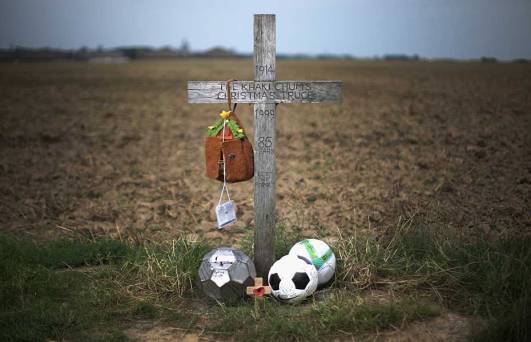
Portrait of Rasputin by Anna Theodora Karup, December 1916.
“Dear friend, I will say again a menacing cloud is over Russia lots of sorrow and grief it is dark and there is no lightning to be seen. A sea of tears immeasurable and as to blood? What can I say? There are no words the horror of it is indescribable. . . they will conquer Germany and what about Russia? If one thinks verily there has not been a greater sufferer since the beginning of time she is all drowned in blood. Terrible is the destruction and without end the grief.” -Grigorii Rasputin, in a letter to Tsar Nicholas II, summer, 1914
In late December in 1916, the Russian mystic Grigorii Rasputin was assassinated, two and a half years into the Great War, two and a half months before the Russian Revolution took shape. Aristocrats in the Empire, notably Prince Felix Yusupov, who had grown to hate the holy man invited him to dinner in Moika Palace in Petrograd, now Saint Petersburg. For years, the Tsar had placed Rasputin closer to his family, or Rasputin inserted himself into the family by influence. In 1907, the Romanovs invited Rasputin to visit the royal family and heal Alexei, heir to the throne and ill with inherited hemophilia. Regardless of who pulled whose strings, he became a strange, alien force in the regime’s inner circles, a peasant-turned-occultist who joined the royal family.
Rasputin was an independent religious leader claiming metaphysical power and an extensive knowledge of the Bible, but he ignored the moral norms of Christianity through his abuse of alcohol and frequent sexual affairs. He was not a priest, but served the role of priest to a family that was just as much a facade as he was. He may have been a sophist or a lunatic, serving an incompetent autocrat to preserve the Romanov lineage, however doomed it was.
He could also be seen as a Shakespearean fool, the peasant-turned-entertainer who speaks candid truths to the audience and characters. Rasputin was a pacifist opposed to the Great War, though his graphic prophecy was not enough to prevent Russia from entering the conflict. His description of the war, noted above, was apocalyptic, and predicted the horror Russia would suffer as a result. Here, then, was a man willing to help the Tsar despite knowing the violence he could allow.
Russia lost approximately 1,997,500 soldiers in the First World War, with France trailing behind at 1,400,000, colonies and all. The brutal winters of the war years devastated armies and limited supplies for the Russian population. Military historian John Keegan points out that the “nature of these titanic battles on the Eastern Front is difficult to represent at a human or individual level. The Russian army, 80 per cent peasant when a majority of Russian peasants were still illiterate, left no literature to compare with that of the Western Front” (161). The majority of those who survived the Eastern Front, in other words, could not record their experiences.
However, a few written texts are telling. A Russian nurse named Lydia Zakharova, for instance, described a trench on the Eastern Front one winter as a “city of the dead, its inhabitants frozen in the most unlikely positions, as if a raging, deadly hurricane had just swept past them” (Storey 116). She adds, almost numbly, that “there is a limit, by the way, beyond which the human mind can perceive no more horrors, as a saturated sponge can soak up no more water” (117). Rasputin did not live to see the totality of the violence he predicted in 1914, but millions of Russian peasants experienced it.
Tsar Nicholas II shares much of the blame for the failures of the Great War. In 1914, he took personal control of the military, deeming himself a kind of commander-in-chief. Like many European leaders, Nicholas naively thought the war would end by Christmas of 1914. Instead it continued year after year after year.
Finally, in early 1917, starved of food and hope, bled of its population, and openly mocked by the Tsar’s aggressive displays of wealth and indifference, Russians began to protest. The Russian Revolution began only as a series of strikes. People were hungry; they couldn’t work anymore; they stopped until they got food. The Tsar, whose brutality was clear in 1905 when he ordered police to shoot protestors in Russia’s Bloody Sunday, ordered soldiers to fire into the crowds of strikers.
However, those who were meant to guard Petrograd consisted of wounded veterans or very young recruits. Healthy, loyal, and experienced soldiers were stationed on the Eastern Front, and those left behind revolted too and chose to protect the protestors. First, the holy fool protested, then soon after the workers, soldiers, guards, and even a few aristocrats realized that 1917 was an apocalypse year for Imperial Russia.
Rasputin’s place in the regime seems like an ill-fitting cog in a machine, but that might be a limited perspective because almost nobody in the regime was fit for rule. The Tsar was incompetent and disinterested, his children were sick with inherited hemophilia, his ministers were torn between the possibility of a democratic Russia or the Tsar’s brutal autocracy. The monarchy was a network of ill-fitting parts. Rasputin, for all his mysteries, might have had the last good idea for Russia’s future: don’t go to war, it will be the end. Instead, Nicholas ignored the dissenting fool and plunged Russia into the sea of tears immeasurable Rasputin predicted.
Keegan, John. The First world War. Vintage Books, 2000.
Storey, William Kelleher. The First World War. Rowman & Littlefield, 2014.
Treadgold, Donald W., Herbert J. Ellison. Twentieth Century Russia. Westview Press, 2000.

